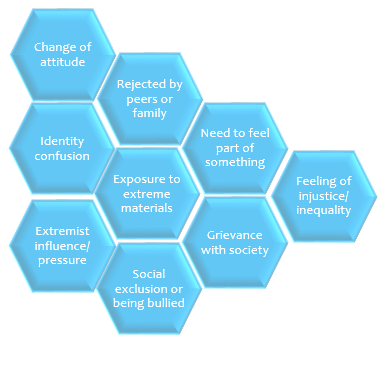Prevent
What is Prevent?
Prevent is a key part of the Government’s Counter Terrorism Strategy (CONTEST); its aim is to reduce the risk of terrorism to the UK, so people can go about their lives freely and with confidence.
CONTEST has four strands, often known as the four Ps:
• Protect- strengthen protection against a terrorist attack
• Prepare- mitigate the impact of a terrorist attack
• Pursue- stop terrorist attacks
• Prevent- stop people becoming terrorists or supporting terrorism
Channel is the key element of the Prevent part of the strategy.
Channel is about safeguarding young people and adults from being drawn into committing terrorist-related activity; through partnership working and early intervention, its aim is to protect and divert people away from the risk they face before crimes occur.
Local authorities, education, health sectors, social services, children’s and youth services, offender management, the police and the local community will all work in partnership to:
1. Identify individuals at risk of being drawn into terrorism
2. Assess the nature and extent of that risk
3. Develop the most appropriate support plan for them
Education providers have both moral and legal obligations in relation to the safety of learners. These range from our duty (under Every Child Matters) to have a safe environment for learners, through to being aware of the types of situations that can create an environment where extremism can develop and taking action to reduce such possibilities.
What does this all mean?
Meanings associated with terrorism are given here in brief:
Terrorism is the unlawful use of violence or threat of violence to support a belief or ideology.
Extremism is the use of extreme behaviour to support a belief or ideology. Not all extremism is harmful or criminal, but some people behave in an extreme way and go on to become terrorists. Any idea can be taken to an extreme, but when they are, they often lead to violence/harm to others.
Radicalisation is the process of someone developing extremist views which can lead them to join extreme or terrorist groups. There is no ‘one-way process’ to radicalisation, there are often many factors or experiences which leads a person to be radicalised to participate in extremist or terrorist behaviour:
What can you do?
There isn’t a magic checklist for parents/ carers/ employers to use to know what could make your young person/ ward/ employee become an extremist; but you may be the best person to notice changes in their behaviour, just as you would with other issues of concern. This is not an easy task but the following points aim to help you.
Talk
Talking is an essential part of the process for young people to explore and understand alternative points of views; talking can help them develop informed and balanced views, values and attitudes. Talking can help you make an assessment of views and understanding giving you an opportunity to clarify facts, address any distortion in their views and identify any issues of concern.
Internet and Social Media
Radicalisers use the internet to ‘groom’ young people. They use sites such as Facebook, Twitter or You Tube. They may invite people to join discussions on less well-known sites such as KiK, Whisper, Yik Yak or Omegle as these are harder to monitor and easier to hide their identity.
What can you do if you have concerns?
If you have concerns about someone being involved in extremism or being radicalised, support and advice is available from a range of experts and services who will work together:
• Internet Matters- www.internetmatters.org provides advice and information about online radicalisation
• Hampshire Police- Call 101 for advice. If someone is at risk of immediate harm call 999
• Prevent Team (Hampshire) Hampshire Police
• Reporting Online Terrorist Material- www.gov.uk/report-terrorism
Alternatively, you can contact Fareport and speak to the Designated Person - Theresa Maple theresa.maple@fareport.co.uk
Useful Links
ACT Action Counters Terrorism https://actearly.uk/
Educate Against Hate https://educateagainsthate.com/
Join The DNA Journey
We only have one world, but it's divided. To find out more about the diversity of the world join The DNA Journey.













